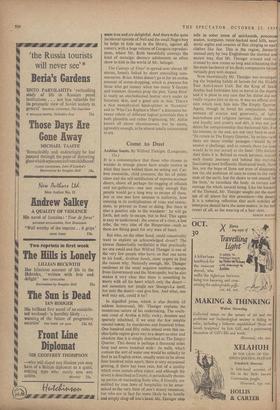Come to Dust
Arabian Sands. By Wilfred Thesiger. (Longmans, 35s.) IT is a commonplace that those who choose to wander in strange places have ample motive in what they leave behind them on setting out. Car- bon monoxide, child crooners, the lies of politi- cians and the self-satisfaction of expense-account diners, above all perhaps the nagging of officials and tax-gatherers—one sees easily enough that people would go a long way to escape all these, just as one sees how anxious is authority, how cunning in its multiplication of visas and restric- tions, to prevent us from so doing. But there is also a positive side to the wanderer : he will go forth, not only to escape, but to find. This again is easy to understand : the source of a river, a lost tribe, the very isles of the Hesperides—such as these are fitting goals for any man of heart.
But who, on the other hand, could conceivably want to explore an acknowledged desert? The answer (historically verifiable) is that practically no one could and that Wilfred Thesiger is one of the very few people who have; so that one turns to his book, Arabian Sands, most urgent to find the reason why. Naturally enough, Mr. Thesiger confesses to the usual negative motives—escape from Government and the Motropolis; but he also makes it very clear that there is something he wants with all his heart which only the desert— not mountain nor jungle nor Shangri-La itself, but only the desert—can give him. And what, one well may ask, could it be?
In dignified prose, which is also flexible (if seldom humorous), Mr. Thesiger explains the monstrous nature of his undertaking. The south- east coast of Arabia is hilly, rocky, desolate and sparsely inhabited, if we omit the few notable coastal towns, by murderous and fanatical tribes. One hundred and fifty miles inland even this un- charitable region gives way to a desert so utter and absolute that it is simply described as The Empty Quarter. This desert is perhaps a thousand miles long and seven hundred wide: its wells, which contain the sort of water one would be unlucky to find in an English sewer, usually seem to be about four hundred miles apart; there is very occasional grazing, if there has been rain, but of a quality which even camels often reject; and although the desert is described as Empty, it periodically throws up parties of marauding Bedu who, if friendly, are entitled by iron laws of hospitality to be enter- tained to the very limit of one's scanty resources, but who are in fact far more likely to be hostile and simply chop oil one's head. Mr. Thesiger also
tells in sober tones of quicksands, poisonous snakes, scorpions, razor-backed sand hills, near- arctic nights and swarms of flies clinging to one's clothes like lice. This is the region, formerly crossed only by two Englishmen the shortest and easiest way, that Mr. Thesiger crossed and re- crossed by new routes so long and exhausting that the most hardened of his Bedu companions turned virtually grey with despair.
Now theoretically Mr. Thesiger was investigat- ing the breeding habits of locusts for the Middle East Anti-Locust Unit. But the King of Saudi Arabia had forbidden him to travel in the desert, and it is plain in any case that his duties did not really require him to do so. It was no official mis- sion which took him into The Empty Quarter. Again, though he loved his companions, their mixture of avarice and generosity, of light- heartedness and religious fervour, their courag and loyalty and cruelty and dirt, it was not just desire for companionship that beckoned him. For his reasons, in the end, are not very hard to seek. 'To return to The Empty Quarter,' he writes—and there are many similar passages—'would be to answer a challenge, and to remain there for long would be to test myself to the limit.' (NI y And there it is. Behind so much heroism, behind such titanic journeys and behind this moving, fascinating (and brilliantly illustrated) book. there lies, not the hope of fame nor even of discovery, not the old ambition of man to come to the very ends of the earth, but the desire to test oneself 'to the limit,' to immolate the body, to torture and outrage the whole natural being. Like the hermits of the Thebaid, Mr. Thesiger sought out the most apt of all places for this procedure—the desert. It is a sobering reflection that such nobility of enterprise should have the same motive, in the last resort of all, as the wearing of a hair shirt.
SIMON RAVEN






































 Previous page
Previous page